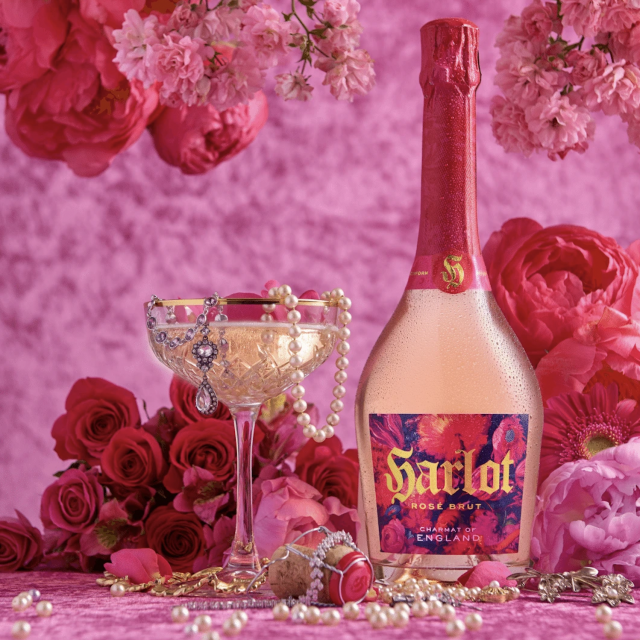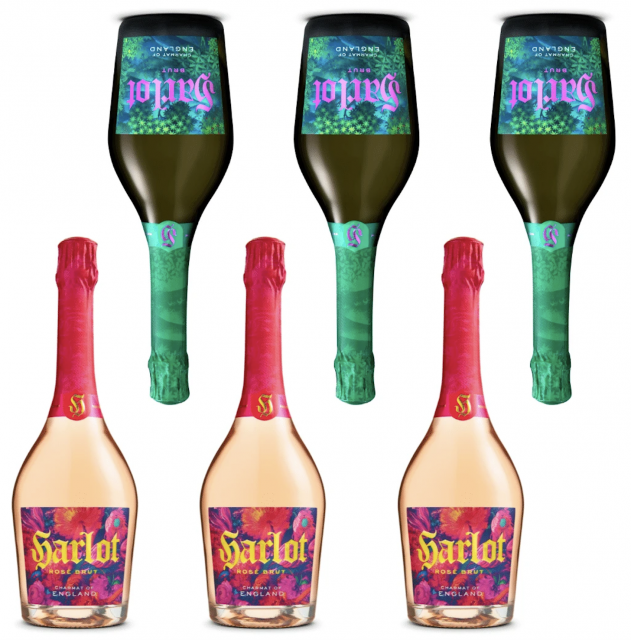New English sparkling wine courts controversy
A new English sparkling wine brand is creating debate within the UK wine scene due to its name, packaging, production method and price, with one critic declaring it “dangerous”.

Called Harlot, the fizz has been described by its creator – MDCV – as “playful” and “non-conformist”, with a label “that pushes the boundaries of design”, and a brand identity that’s “inclusive”.
Notably, the sparkling wine gains its fizz via a second fermentation in a tank, as opposed to the bottle in which its sold, which means that it’s made like Prosecco, not Champagne.
While the vast majority of English sparkling wine is bottle-fermented, Harlot’s cheaper tank (or Charmat) method approach allows it to sell for a retail price of £15 for its brut (£16 for the rosé), undercutting all its rivals made in the same way as Champagne, known as the ‘traditional method’.
Nevertheless, by tank-method standards, Harlot is relatively expensive – most Prosecco sells below £10.
Per an article on cityam.com by Libby Zietsman-Brodie, it is clear that some in the UK wine trade have not welcomed the deliberately disruptive Harlot branding, nor its tank-only approach to production.
Sophia Longhi of Skin and Pulp described it as “garish”, while Hannah Milnes of Bouchon Media said its name – a term for a female prostitute – was far from ‘inclusive’, commenting that it “serves to drive the division of the sexes”.
Meanwhile, Tom Cannavan, founder of Wine Pages, said that the arrival of the relatively inexpensive Harlot was “dangerous” for the emerging English sparkling wine industry, and “confusing” for the consumer, who would, for the most part, fail to appreciate the cheaper method used to make this new sparkling wine.
Furthermore, commenting on Cannavan’s website, leading UK viticulturist and English wine expert Stephen Skelton MW said that he believed Harlot would be a “loss-leader” at its £15 rrp. This he said was due to the high cost of growing grapes in Britain – a result of low and variable yields – which in Harlot’s case would be exacerbated by the brand owner’s decision to manage the vineyards organically.
Harlot is the latest product from the wine group called MDCV, which comprises Provençal rosé and English sparkling wine businesses.
The company is owned by Mark Dixon, who is a Monaco-based English billionaire businessman, and most famous as the founder of the serviced office business Regus, which was renamed International Workplace group in 2016.
He currently owns four wineries in Provence that total 350 hectares – Château de Berne, Château des Bertrands, Château Saint-Roux and Ultimate Provence – and two in the UK: Sedlescombe – the newly enlarged biodynamic producer in East Sussex – and Kingscote Wine Estate in West Sussex, which he has put up for sale.
As previously reported on by db, Dixon plans to become England’s biggest wine producer, with as many as 400 hectares of vineyards, primarily in Kent, where he has recently planted 160ha on former organic farmland near the village of Cuxton in Gravesham, creating the largest single wine estate in the UK.
He’s also enlisted the celebrated architect firm Foster and Partners to design a winery for his Kent-based project, which is been named the Kentish Wine Vault, where he aims to make between 4-5 million bottles, more than double the quantity produced by Britain’s biggest sparkling winemaker today: Nyetimber.
Unlike Champagne, where the sparkling wine has to be bottle-fermented to carry the name of the region, English sparkling wine can be made in a number of ways, which has encouraged WineGB – the national association for the English and Welsh wine industry – to create a ‘hallmark’ for those producers who choose the traditional method for sparkling wine production.
A small logo alongside the description ‘Great British Classic Method’ was introduced in March this year to set out some rules for those who choose to use the hallmark and description.
Partner Content
As recorded by db at the time, bottles bearing the hallmark are subject to three stipulations: grapes must have been grown in England and Wales, second fermentation must take place in bottle, and a period of ageing on lees must take place before release, but with the length unspecified.
Harlot is not the first English wine to be made using this tank method.
In 2018, Norfolk-based Flint Vineyard claimed it was the first English wine producer to ferment a sparkling wine in the style of a Prosecco, although it was another English winery, called Fitz from West Sussex, that was the first to actually released a tank method fizz on to the market.
At the time, there was concern expressed among some traditional UK sparkling producers that these new products would undermine the reputation of English fizz, which has been built on bottle-fermented fizz – a production method that tends to yield finer, more persistent bubbles than tank-method fizz, and appealing biscuit-like aromatics from the close contact in the bottle between the wine and the lees, a by-product of the fermentation.
A year after the Flint and Fitz launches, Chapel Down released a carbonated Sparkling Bacchus from the 2018 harvest, while Albourne Estate in Sussex made ‘England’s first frizzante’ from the same grape and harvest, which was created using the tank method.

Harlot currently comprises two non-vintage, tank-method sparkling wines, both of which are available in 75cl or 150cl bottles.
Harlot Brut is blend of Bacchus, Pinot Noir, Meunier and Chardonnay. It is described as having “aromas and flavours of English elderflower, pears and ripe apricots”.
Harlot Brut Rosé is also made with Bacchus, Pinot Noir, Meunier and Chardonnay, and gets its colour from a brief contact with the skins of the Pinot Noir. It is said to have “aromas and flavours of English pears, ripe red apples and strawberries”.
The MDCV group has also announced a partnership with “model and influencer” Portia Freeman, who will be a brand ambassador for Harlot, along with the MDCV’s Provence rosés.
Read more
Time to ‘claim back’ use of ‘Great British’ for sparkling wine
Foster design for UK’s biggest wine project
Click here to read Tom Cannavan’s comments in full on Harlot




